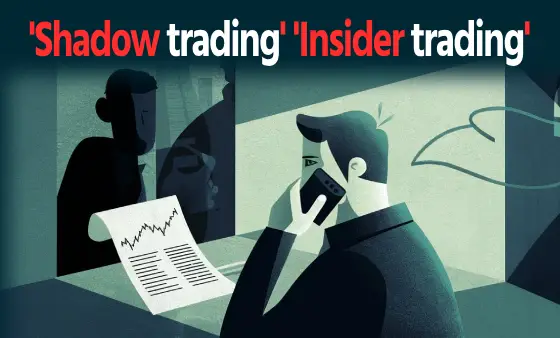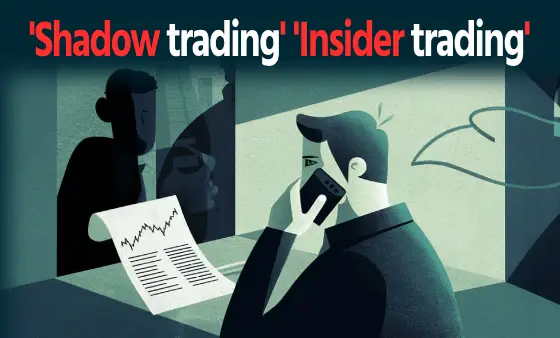Table of Contents
Overview of ‘Shadow Trading’ and ‘Insider Trading’
I recently read a news article related to insider trading in the U.S. market. When Gurbir Grewal, Director of Enforcement of SEC, said that America’s leading market regulator, the U.S. The Securities and Exchange Commission (SEC) has begun investigating the policies of investment advisers and other firms to determine whether they have strong enough policies to prevent misuse of non-public information. Grewal says the mere threat of jail and fines does not stop insider trading, so firms need to tighten their policies to prevent abuses.
According to Gurbir Grewal, the agency now wants to take action on policies and procedures that are ineffective and are part of a broader investigation into insider trading.

The SEC aims not only at insider trading in the equity markets but also at the possibility of profiting from non-public information or concealing misconduct by using complex financial instruments such as swaps or derivatives.
Just this month, under Grewal’s leadership, the agency won a victory in a “shadow trading” case when a jury found that a former pharmaceutical company executive traded one of his kind after learning of the acquisition of his company, Medivation Inc. Violated civil insider-trading laws by betting on another company’s stock.
The case has already prompted companies to begin examining their policies to ensure they meet a broader standard against misuse of non-public information.
Now, you can think that even in big countries where the rules and regulations are so strict, insider trading is still carried out, and even today, the agencies and regulatory authorities there think that insider trading is The rules for trading should be more strict and strict, there should be work to think about it in our country also and make some strict and strict laws to stop Insider Trading.
Let us know what “shadow trading” and “insider trading” are and what the rules are regarding insider trading in our country, i.e., India.
What is ‘Shadow Trading’?
‘Shadow trading’ is a new concept that has been defined by the U.S. Securities and Exchange Commission (SEC). It is a form of insider trading in which a person uses non-public information about his company to trade in the shares of another company that is ‘economically linked’ to his company.
This means that if someone has information about his own company and uses this information to trade in the shares of another company of his kind, which has direct or indirect links with his company, then he is doing ‘shadow trading.”
For example, suppose a person receives information about an acquisition of his own company and uses this information to trade in shares of a competing company that he believes are likely to increase in value after the acquisition, this would be considered ‘shadow trading.’ and This is a violation of trading rules, and the SEC is taking action against such trading.
How does Shadow Trading work?
Imagine you work for Company A and learn they’re about to acquire Company B. You can’t legally buy Company B shares based on this knowledge. But, under shadow trading, you could buy shares in a competitor of Company B, expecting their value to rise due to the acquisition.
What is ‘Insider trading’?
Insider trading is when some persons make extra gains in the stock market through the use of undisclosed information, like information on expected dividends, expected decline or rise in profits, any information on the acquisition, merger, potential threats, etc., or any other price-sensitive information.

In the Indian context, the term insider is used for those who have a direct or indirect connection to the organization or otherwise and have access to unpublished price-sensitive information. Insiders can be connected individuals or relatives, but the fact to be considered in this regard is the accessibility to unpublished price-sensitive information.
The individual who has any scope to get access to or obtain unpublished price-sensitive details of one company or group of companies is also liable to be marked as an insider. Accessibility and possession of unpublished price-sensitive information are major aspects of being considered an insider in the Indian legal context.
Insider trading is a highly complex issue, and it is almost impossible to get rid of it because it evolves from a fundamental human instinct, i.e., greed. One who has insider information arrives at a decision of future profit or reduction of loss by discounting such information; it is extremely difficult for him to keep himself abstain from trading based on that information.
Here are some examples:
- Merger or Acquisition Information: If a company is about to merge or acquire another company, and its employee has inside information about this. So in such a situation, if those employees trade in the securities of their company using this information, then it is called ‘insider trading’.
- Use of confidential information by the CEO: Many times, the CEO of a company who has secret information about his company trades in his company’s securities on the basis of this hidden information, which causes him to make illegal profits.
- Other examples: Another example is when a person trades in shares based on the company’s confidential information.
Indian cases of Insider trading
India has witnessed several high-profile cases of insider trading that have attracted attention due to their financial magnitude and the individuals involved. Some notable cases include:
- Reliance Petroinvestments Limited (RPIL) Case: In this case, SEBI fined Reliance Industries Limited (RIL) and its Chairman, Mukesh Ambani, for alleged insider trading in the shares of Reliance Petroleum Limited (RPL) during the 2007 merger.
- Rajat Gupta Case: Rajat Gupta, a former board member of Goldman Sachs and Procter & Gamble, was convicted in the United States for insider trading. While not the case in India, it highlighted the global reach of insider trading regulations and the seriousness with which such violations are treated.
- Satyam Computers Scandal: The Satyam Computers scandal, one of the largest corporate frauds in India, involved accounting manipulations. Though not solely an insider trading case, it underscored the importance of transparency and integrity in financial markets.
- General Insurance Company: In October 2019, SEBI sent a notice to the General Insurance Company (GIC) informing the firm regarding impending insider trading investigations. The notice also provided a settlement offer to the insurance provider. In December of the same year, GIC settled the charges by paying a penalty of around Rs. 1.23 Crore.
- Infosys: The IT company was found in violation of SEBI insider trading regulations when it failed to make public an allegation of a company insider regarding illegal trading. While the original complaint was filed on September 20, 2019, the matter came to light when the whistleblower mailed a copy of the same to the media a month later, in October. In November, the lead independent director of Infosys, Kiran Mazumdar Shaw, settled the charges by paying a fine of Rs. 3 Lakh to SEBI.
- Rakesh Jhunjhunwala: Independent investor and billionaire Rakesh Jhunjhunwala was summoned by SEBI for alleged insider trading at Aptech Limited. According to reports, the regulatory body is investigating the period between February and September 2016. In addition to Jhunjhunwala, SEBI also investigated his family members’ role in the matter.
- Balram Garg: Another high-profile case of alleged insider trading came to light in December 2019 when SEBI sent a notice to PC Jeweller Managing Director Balram Garg. At the same time, the government body ordered the impounding of around Rs. 8 Crore that two promoters and associated entities earned from suspected illegal trading.
Sebi Rules for Insider Trading
SEBI (Security And Exchange Board of India) has taken many strict steps to control insider trading. Insider trading rules have Also been implemented, as has a market surveillance system.
This system monitors unusual market patterns. SEBI has also made efforts to improve it continuously.
Some important parameters have been set by SEBI, which are as follows:
- Promoters, management or employees are not allowed to trade in the shares of the company during the 48 hours before and after any announcement by the company.
- This criteria also applies to those auditors, law firms, analysts, and advisors who advise the company.
- Besides, the rule of keeping the trading window closed for 48 hours after the company declares its quarterly results was also implemented.
SEBI has also introduced the provision of strict punishment for violating the rules mentioned above. And many companies have also been punished by SEBI.
Conclusion
The impact, extent, and effects of insider trading might vary in each country, but any amount of insider trading has a massive impact on the reputation of the country. Every shareholder invests their money in the market with prior faith in transparency and efficiency.
Any investor, while making their decision about investment (to sell, buy, or hold stock), relies upon the available price-sensitive information provided by the listed company in the stock exchange. Investment in the securities market has increased many folds in recent times.
Globalization has created many ways to invest money, and investments are being made all over the world by citizens of different nations. When an investor relies upon the available price-sensitive information, he has the prior thought of trust about the correctness of the value of the security he is trading. Even after making the price-sensitive information public, one segment of the company still has the information, which finally decides the value of the security. When such persons use this information to invest in the market, they are
known as ‘Insiders.’ Such insiders get price-sensitive information prior to the listing of the stocks in the market because of the position they hold in the company. When such persons pass such information on to others or use the same for their benefit, either to buy or sell the shares, they are involved in insider trading.
Over the last few decades, world securities markets have become significantly more sophisticated in terms of how securities are traded, as well as the variety of securities traded.
The integrity of securities markets is critical to the economy of a country, and it is necessary for regulators to enforce laws prohibiting market abuse in order to protect market integrity. As a result of these changes, markets are becoming truly global, thereby allowing traders to trade almost instantly across a wide variety of products and in markets around the world.
FAQs
What is the Insider trading?
Insider trading is when some persons make extra gains in the stock market through the use of undisclosed information, like information on expected dividends, expected decline or rise in profits, any information on the acquisition, merger, potential threats, etc., or any other price-sensitive information.
What is the shadow trading?
This means that if someone has information about his own company and uses this information to trade in the shares of another company of his kind, which has direct or indirect links with his company, then he is doing ‘shadow trading.”
What’s the difference between insider trading and shadow trading?
In insider trading, you trade in the shares of your own company using undisclosed information. In shadow trading, you trade in the shares of a different company, but one that’s economically linked to yours, again using undisclosed information.
Check this for Upcoming IPOs: IPO Pulse
Check this to learn Trading: Trade & Tutorials
